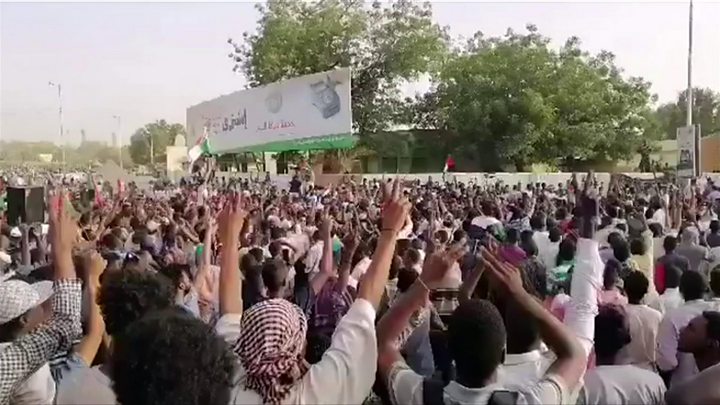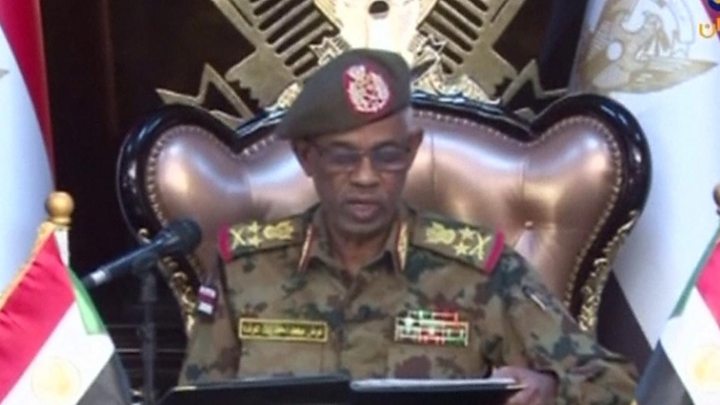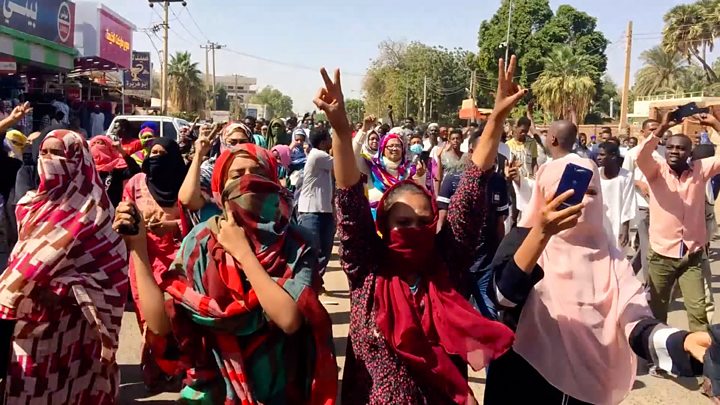Sudan's military leaders have sought to reassure people protesting against the coup that their only concern is public order, as a stand-off continues.
A member of the new military council, Lt-Gen Omar Zain al-Abidin, said it was for the protesters to decide Sudan's political and economic future.
However, demonstrators fear the coup leaders are too close to deposed President Omar al-Bashir.
The military says it will not extradite him on war crimes charges.
However, he may be put on trial inside Sudan, according to the military council.
Mr Bashir, one of the world's longest-serving leaders until he was ousted on Thursday, is now in custody.
His downfall followed months of unrest which began in December over Sudan's rising cost of living. At least 38 people have died in the protests.
Mr Bashir is the subject of two international arrest warrants issued by the International Criminal Court (ICC), which accuses him of organising war crimes and crimes against humanity in Sudan's Darfur region between 2003 and 2008.
What are the military offering the protesters?
The army has said it will oversee a two-year transitional period followed by elections. As part of this it is imposing a three-month state of emergency, with the constitution suspended.
Lt-Gen Abidin, who heads the military council's political committee, said on Friday: "The solutions will be devised by those in protest.
"You, the people, will provide the solutions for all economic and political issues. We have come with no ideology, we have come here to maintain order and security to provide the opportunity for the people of Sudan to achieve the change they aspire to.
"We have no ambition to hold the reins of power. We are here to provide an all-inclusive umbrella.
"Our key responsibility is to maintain public order," he added. "We will have zero tolerance for any misdeed in any corner of the country."
Why are protesters so wary?
Thousands remained camped out near military headquarters in the capital, Khartoum, on Friday, ignoring a curfew declared by the military.
The new military council is headed by Defence Minister Awad Ibn Auf who was previously regarded as being well placed to succeed Mr Bashir.
During the Darfur conflict, he was head of military intelligence and the US imposed sanctions on him in 2007 in relation to his alleged support for militia blamed for atrocities there.
Sara Abdeljalil, a member of the Sudanese Professionals' Association (SPA) which has spearheaded the protests, said on Thursday that the new military council was a "continuation of the same regime".
"So what we need to do is to continue the fight and the peaceful resistance," she said.

Media playback is unsupported on your device
Reacting to the military's conciliatory statement on Friday, Khartoum resident Tagreed Abdin told the BBC she was not reassured.
"First of all we don't know who's behind the military council," she said.
"We are used to hearing government double-speak but we need to see if they're really interested in dialogue and listening to the voices of the people."
How did Thursday's coup unfold?
Early on Thursday, military vehicles entered the large compound in Khartoum housing the defence ministry, the army headquarters and Mr Bashir's personal residence.
State TV and radio interrupted programming and Mr Ibn Auf announced "the toppling of the regime". He said Mr Bashir was being held "in a secure place" but did not give details.

Media playback is unsupported on your device
Mr Ibn Auf said the country had been suffering from "poor management, corruption, and an absence of justice" and he apologised "for the killing and violence that took place".
What is the reaction abroad?
UN Secretary-General António Guterres appealed for "calm and utmost restraint by all" and urged a transition that would meet the "democratic aspirations" of the people. The UN Security Council is to discuss the situation in a closed-door meeting on Friday.
UK Foreign Secretary Jeremy Hunt said that a two-year military council was "not the answer" and called for a "swift move to an inclusive, representative, civilian leadership".

Media playback is unsupported on your device
The African Union condemned the military takeover, saying it was not an appropriate response to the challenges facing Sudan and the aspirations of its people.
Russia, which twice hosted Mr Bashir despite the international travel ban he faced, called for calm.
Have you been taking part in protests? You can share your experiences by emailing haveyoursay@bbc.co.uk
Please include a contact number if you are willing to speak to a BBC journalist. You can also contact us in the following ways:
- WhatsApp: +44 7555 173285
- Tweet: @BBC_HaveYourSay
- Send pictures/video to yourpics@bbc.co.uk
- Upload your pictures / video here
- Text an SMS or MMS to 61124 or +44 7624 800 100
- Please read our terms & conditions and privacy policy
https://www.bbc.com/news/world-africa-47908785
2019-04-12 10:35:29Z
52780266841167
Tidak ada komentar:
Posting Komentar